Business Ethics: Kantian Theory and Virtue Ethics- Criticism Analysis
VerifiedAdded on 2021/04/16
|6
|1277
|41
Essay
AI Summary
This essay delves into Kantian moral theory and Virtue ethics, core concepts in business ethics. It begins by outlining Kant's deontological approach, emphasizing the importance of a good will and categorical imperatives. The essay critiques Kantian theory, highlighting its metaphysical nature and difficulties in defining perception. It then explores the strengths, such as its straightforward morality and emphasis on human dignity, as well as weaknesses, including its rigidity and potential for demotivating behavior. The essay then transitions to Virtue ethics, defining virtue as a character trait that makes an individual good, drawing on Aristotle's concept of happiness. It discusses criticisms of Virtue ethics, such as the unclear definition of virtue and its self-centered focus, while also acknowledging its strengths in observing the character of moral agents and addressing human emotions. The essay concludes by referencing relevant literature to support its arguments.
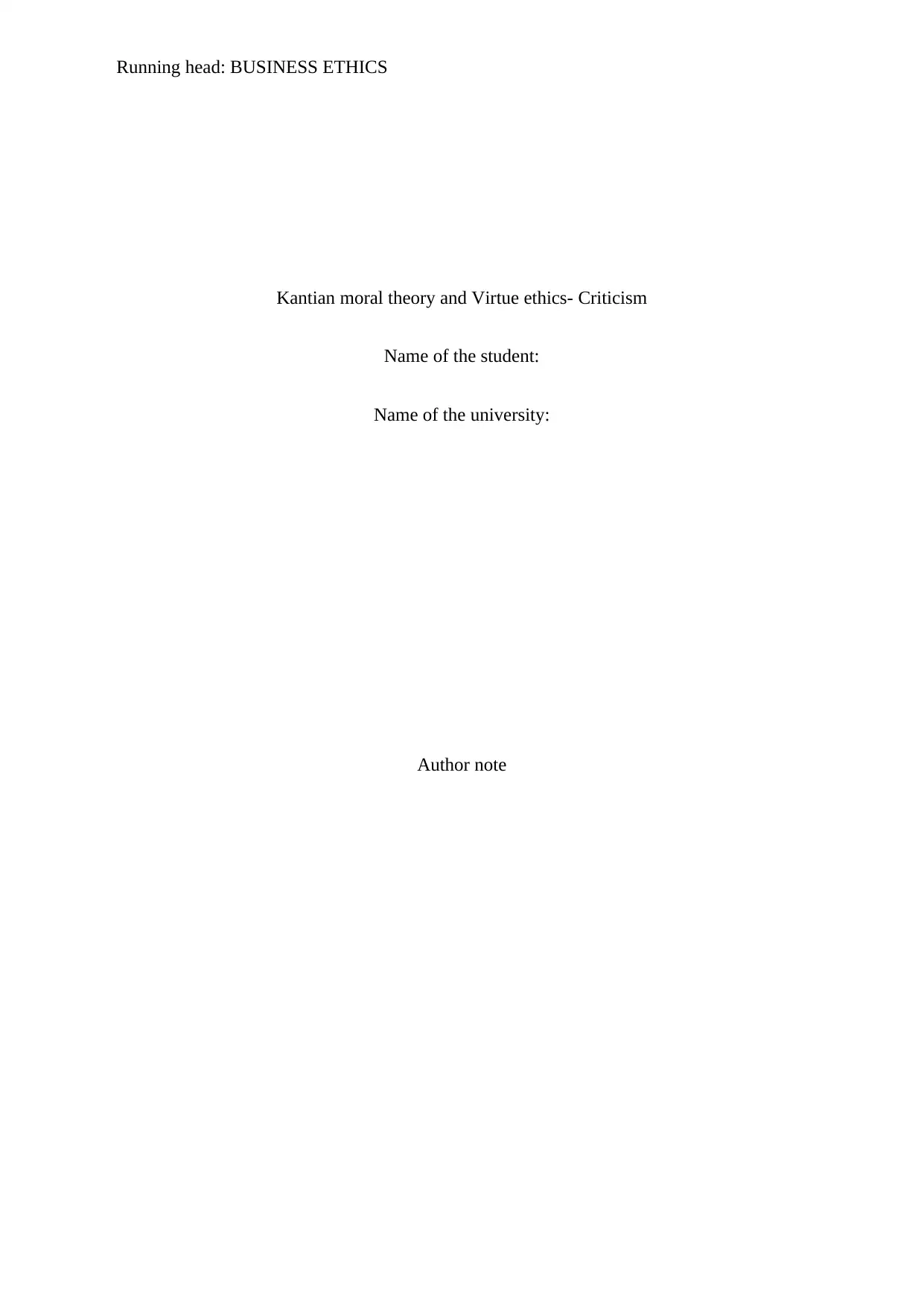
Running head: BUSINESS ETHICS
Kantian moral theory and Virtue ethics- Criticism
Name of the student:
Name of the university:
Author note
Kantian moral theory and Virtue ethics- Criticism
Name of the student:
Name of the university:
Author note
Paraphrase This Document
Need a fresh take? Get an instant paraphrase of this document with our AI Paraphraser
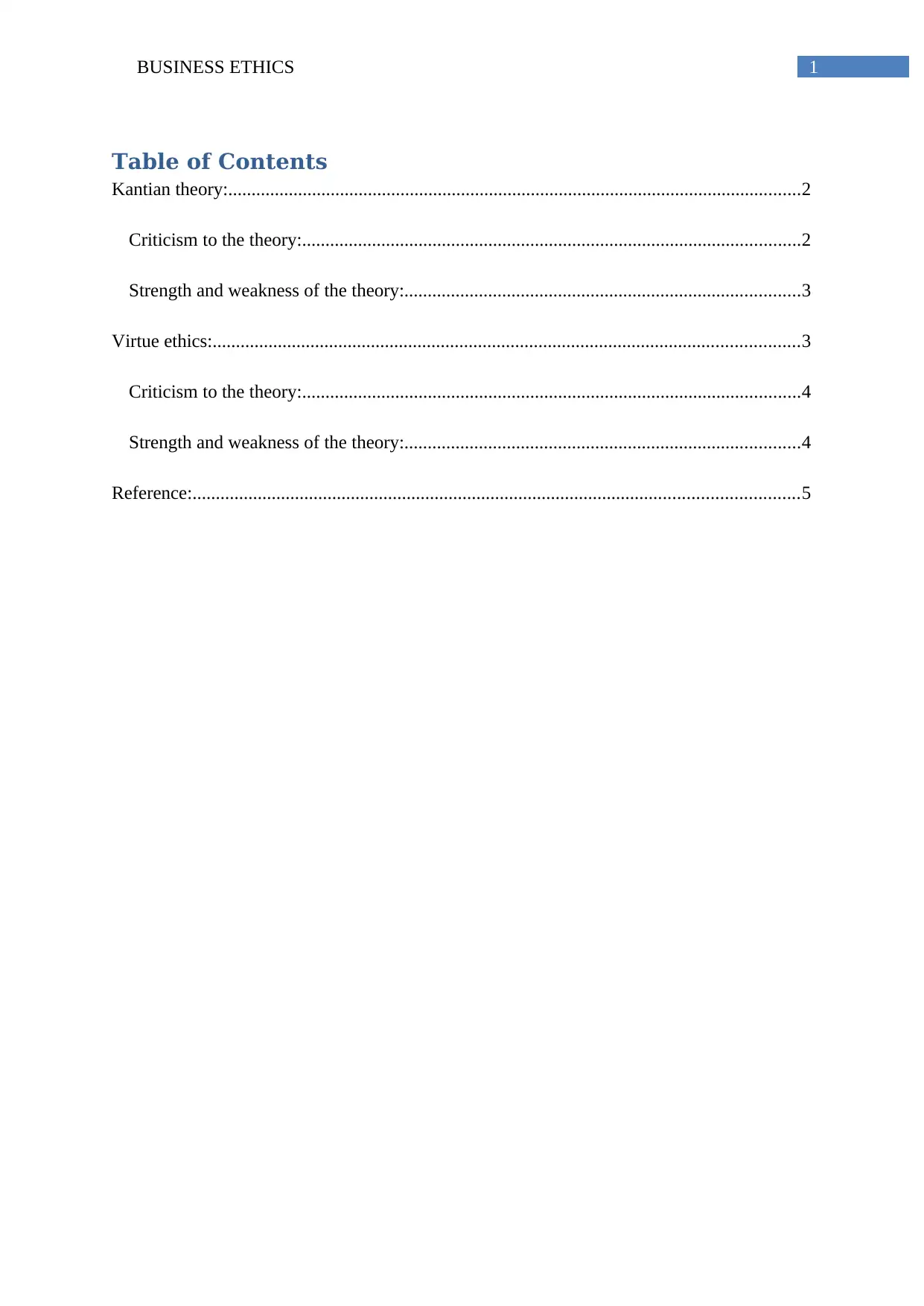
1BUSINESS ETHICS
Table of Contents
Kantian theory:...........................................................................................................................2
Criticism to the theory:...........................................................................................................2
Strength and weakness of the theory:.....................................................................................3
Virtue ethics:..............................................................................................................................3
Criticism to the theory:...........................................................................................................4
Strength and weakness of the theory:.....................................................................................4
Reference:..................................................................................................................................5
Table of Contents
Kantian theory:...........................................................................................................................2
Criticism to the theory:...........................................................................................................2
Strength and weakness of the theory:.....................................................................................3
Virtue ethics:..............................................................................................................................3
Criticism to the theory:...........................................................................................................4
Strength and weakness of the theory:.....................................................................................4
Reference:..................................................................................................................................5
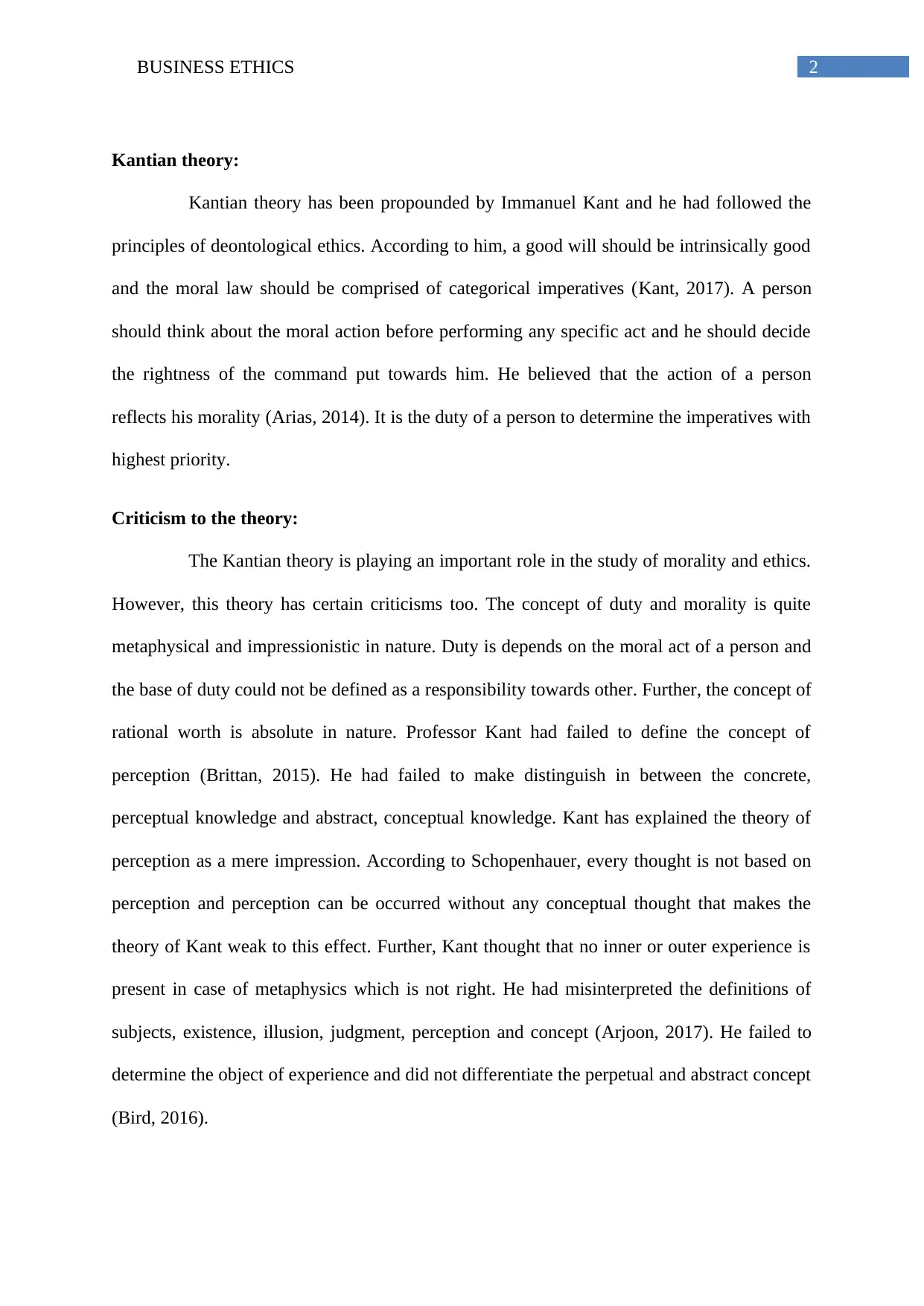
2BUSINESS ETHICS
Kantian theory:
Kantian theory has been propounded by Immanuel Kant and he had followed the
principles of deontological ethics. According to him, a good will should be intrinsically good
and the moral law should be comprised of categorical imperatives (Kant, 2017). A person
should think about the moral action before performing any specific act and he should decide
the rightness of the command put towards him. He believed that the action of a person
reflects his morality (Arias, 2014). It is the duty of a person to determine the imperatives with
highest priority.
Criticism to the theory:
The Kantian theory is playing an important role in the study of morality and ethics.
However, this theory has certain criticisms too. The concept of duty and morality is quite
metaphysical and impressionistic in nature. Duty is depends on the moral act of a person and
the base of duty could not be defined as a responsibility towards other. Further, the concept of
rational worth is absolute in nature. Professor Kant had failed to define the concept of
perception (Brittan, 2015). He had failed to make distinguish in between the concrete,
perceptual knowledge and abstract, conceptual knowledge. Kant has explained the theory of
perception as a mere impression. According to Schopenhauer, every thought is not based on
perception and perception can be occurred without any conceptual thought that makes the
theory of Kant weak to this effect. Further, Kant thought that no inner or outer experience is
present in case of metaphysics which is not right. He had misinterpreted the definitions of
subjects, existence, illusion, judgment, perception and concept (Arjoon, 2017). He failed to
determine the object of experience and did not differentiate the perpetual and abstract concept
(Bird, 2016).
Kantian theory:
Kantian theory has been propounded by Immanuel Kant and he had followed the
principles of deontological ethics. According to him, a good will should be intrinsically good
and the moral law should be comprised of categorical imperatives (Kant, 2017). A person
should think about the moral action before performing any specific act and he should decide
the rightness of the command put towards him. He believed that the action of a person
reflects his morality (Arias, 2014). It is the duty of a person to determine the imperatives with
highest priority.
Criticism to the theory:
The Kantian theory is playing an important role in the study of morality and ethics.
However, this theory has certain criticisms too. The concept of duty and morality is quite
metaphysical and impressionistic in nature. Duty is depends on the moral act of a person and
the base of duty could not be defined as a responsibility towards other. Further, the concept of
rational worth is absolute in nature. Professor Kant had failed to define the concept of
perception (Brittan, 2015). He had failed to make distinguish in between the concrete,
perceptual knowledge and abstract, conceptual knowledge. Kant has explained the theory of
perception as a mere impression. According to Schopenhauer, every thought is not based on
perception and perception can be occurred without any conceptual thought that makes the
theory of Kant weak to this effect. Further, Kant thought that no inner or outer experience is
present in case of metaphysics which is not right. He had misinterpreted the definitions of
subjects, existence, illusion, judgment, perception and concept (Arjoon, 2017). He failed to
determine the object of experience and did not differentiate the perpetual and abstract concept
(Bird, 2016).
⊘ This is a preview!⊘
Do you want full access?
Subscribe today to unlock all pages.

Trusted by 1+ million students worldwide
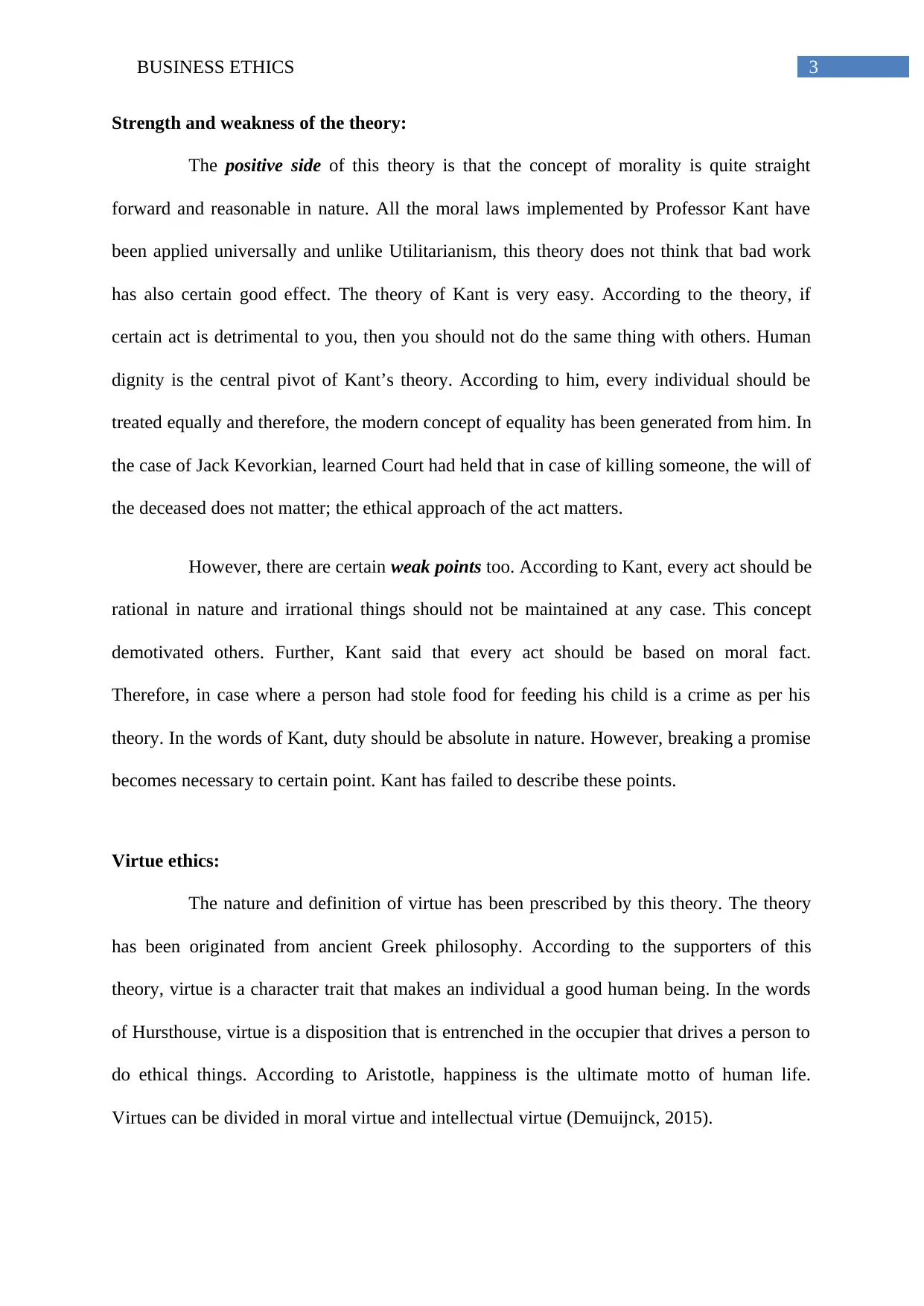
3BUSINESS ETHICS
Strength and weakness of the theory:
The positive side of this theory is that the concept of morality is quite straight
forward and reasonable in nature. All the moral laws implemented by Professor Kant have
been applied universally and unlike Utilitarianism, this theory does not think that bad work
has also certain good effect. The theory of Kant is very easy. According to the theory, if
certain act is detrimental to you, then you should not do the same thing with others. Human
dignity is the central pivot of Kant’s theory. According to him, every individual should be
treated equally and therefore, the modern concept of equality has been generated from him. In
the case of Jack Kevorkian, learned Court had held that in case of killing someone, the will of
the deceased does not matter; the ethical approach of the act matters.
However, there are certain weak points too. According to Kant, every act should be
rational in nature and irrational things should not be maintained at any case. This concept
demotivated others. Further, Kant said that every act should be based on moral fact.
Therefore, in case where a person had stole food for feeding his child is a crime as per his
theory. In the words of Kant, duty should be absolute in nature. However, breaking a promise
becomes necessary to certain point. Kant has failed to describe these points.
Virtue ethics:
The nature and definition of virtue has been prescribed by this theory. The theory
has been originated from ancient Greek philosophy. According to the supporters of this
theory, virtue is a character trait that makes an individual a good human being. In the words
of Hursthouse, virtue is a disposition that is entrenched in the occupier that drives a person to
do ethical things. According to Aristotle, happiness is the ultimate motto of human life.
Virtues can be divided in moral virtue and intellectual virtue (Demuijnck, 2015).
Strength and weakness of the theory:
The positive side of this theory is that the concept of morality is quite straight
forward and reasonable in nature. All the moral laws implemented by Professor Kant have
been applied universally and unlike Utilitarianism, this theory does not think that bad work
has also certain good effect. The theory of Kant is very easy. According to the theory, if
certain act is detrimental to you, then you should not do the same thing with others. Human
dignity is the central pivot of Kant’s theory. According to him, every individual should be
treated equally and therefore, the modern concept of equality has been generated from him. In
the case of Jack Kevorkian, learned Court had held that in case of killing someone, the will of
the deceased does not matter; the ethical approach of the act matters.
However, there are certain weak points too. According to Kant, every act should be
rational in nature and irrational things should not be maintained at any case. This concept
demotivated others. Further, Kant said that every act should be based on moral fact.
Therefore, in case where a person had stole food for feeding his child is a crime as per his
theory. In the words of Kant, duty should be absolute in nature. However, breaking a promise
becomes necessary to certain point. Kant has failed to describe these points.
Virtue ethics:
The nature and definition of virtue has been prescribed by this theory. The theory
has been originated from ancient Greek philosophy. According to the supporters of this
theory, virtue is a character trait that makes an individual a good human being. In the words
of Hursthouse, virtue is a disposition that is entrenched in the occupier that drives a person to
do ethical things. According to Aristotle, happiness is the ultimate motto of human life.
Virtues can be divided in moral virtue and intellectual virtue (Demuijnck, 2015).
Paraphrase This Document
Need a fresh take? Get an instant paraphrase of this document with our AI Paraphraser
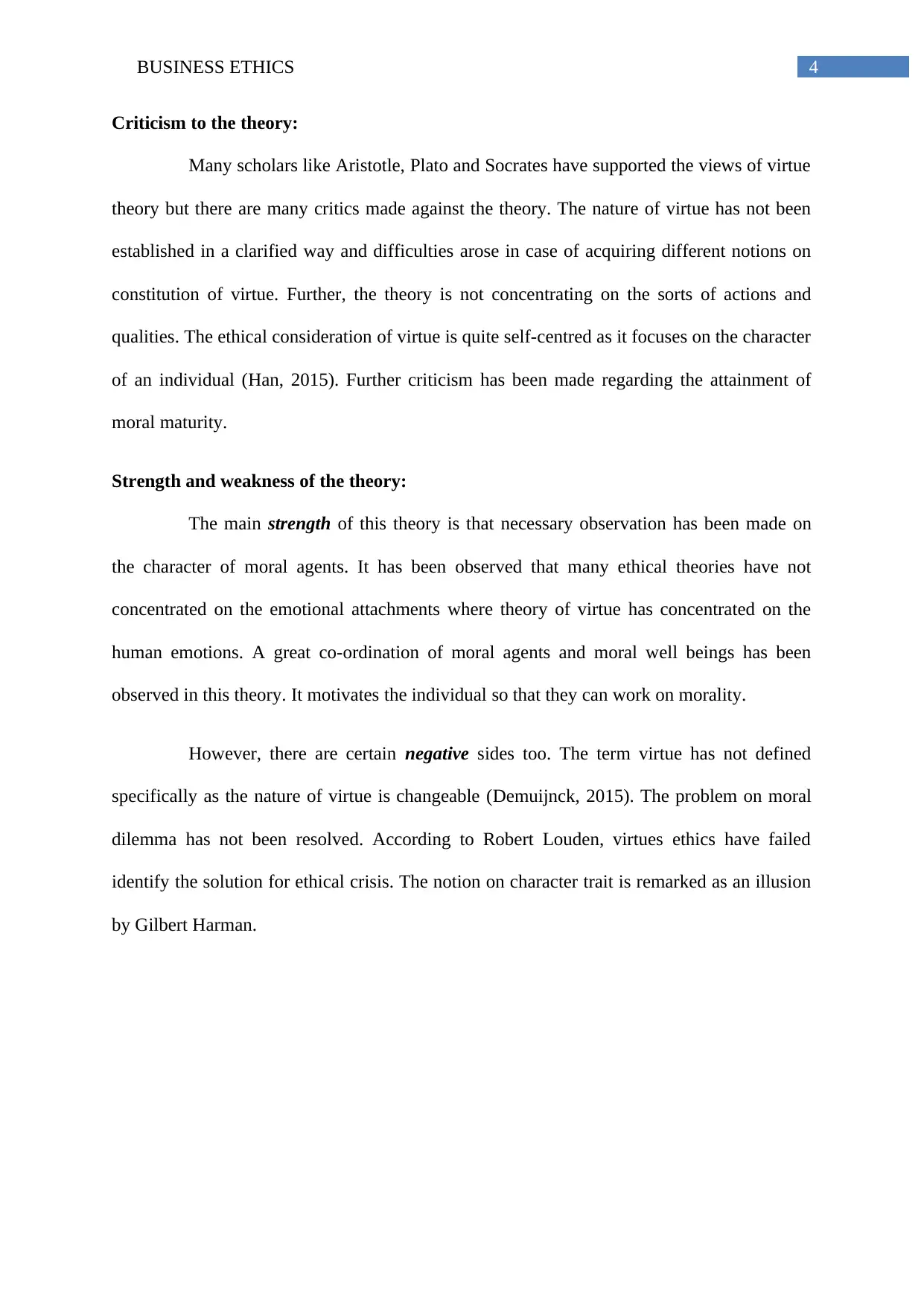
4BUSINESS ETHICS
Criticism to the theory:
Many scholars like Aristotle, Plato and Socrates have supported the views of virtue
theory but there are many critics made against the theory. The nature of virtue has not been
established in a clarified way and difficulties arose in case of acquiring different notions on
constitution of virtue. Further, the theory is not concentrating on the sorts of actions and
qualities. The ethical consideration of virtue is quite self-centred as it focuses on the character
of an individual (Han, 2015). Further criticism has been made regarding the attainment of
moral maturity.
Strength and weakness of the theory:
The main strength of this theory is that necessary observation has been made on
the character of moral agents. It has been observed that many ethical theories have not
concentrated on the emotional attachments where theory of virtue has concentrated on the
human emotions. A great co-ordination of moral agents and moral well beings has been
observed in this theory. It motivates the individual so that they can work on morality.
However, there are certain negative sides too. The term virtue has not defined
specifically as the nature of virtue is changeable (Demuijnck, 2015). The problem on moral
dilemma has not been resolved. According to Robert Louden, virtues ethics have failed
identify the solution for ethical crisis. The notion on character trait is remarked as an illusion
by Gilbert Harman.
Criticism to the theory:
Many scholars like Aristotle, Plato and Socrates have supported the views of virtue
theory but there are many critics made against the theory. The nature of virtue has not been
established in a clarified way and difficulties arose in case of acquiring different notions on
constitution of virtue. Further, the theory is not concentrating on the sorts of actions and
qualities. The ethical consideration of virtue is quite self-centred as it focuses on the character
of an individual (Han, 2015). Further criticism has been made regarding the attainment of
moral maturity.
Strength and weakness of the theory:
The main strength of this theory is that necessary observation has been made on
the character of moral agents. It has been observed that many ethical theories have not
concentrated on the emotional attachments where theory of virtue has concentrated on the
human emotions. A great co-ordination of moral agents and moral well beings has been
observed in this theory. It motivates the individual so that they can work on morality.
However, there are certain negative sides too. The term virtue has not defined
specifically as the nature of virtue is changeable (Demuijnck, 2015). The problem on moral
dilemma has not been resolved. According to Robert Louden, virtues ethics have failed
identify the solution for ethical crisis. The notion on character trait is remarked as an illusion
by Gilbert Harman.
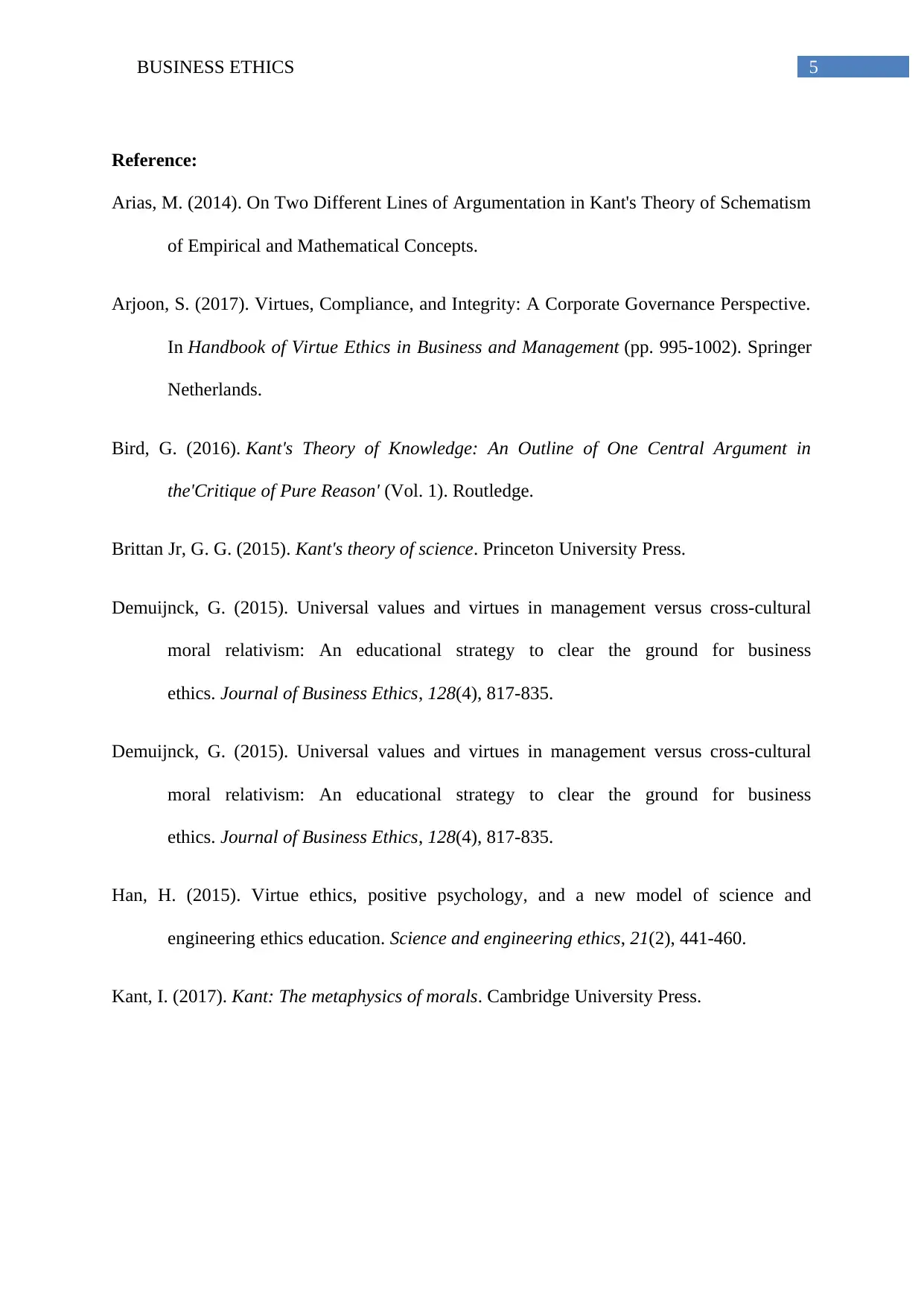
5BUSINESS ETHICS
Reference:
Arias, M. (2014). On Two Different Lines of Argumentation in Kant's Theory of Schematism
of Empirical and Mathematical Concepts.
Arjoon, S. (2017). Virtues, Compliance, and Integrity: A Corporate Governance Perspective.
In Handbook of Virtue Ethics in Business and Management (pp. 995-1002). Springer
Netherlands.
Bird, G. (2016). Kant's Theory of Knowledge: An Outline of One Central Argument in
the'Critique of Pure Reason' (Vol. 1). Routledge.
Brittan Jr, G. G. (2015). Kant's theory of science. Princeton University Press.
Demuijnck, G. (2015). Universal values and virtues in management versus cross-cultural
moral relativism: An educational strategy to clear the ground for business
ethics. Journal of Business Ethics, 128(4), 817-835.
Demuijnck, G. (2015). Universal values and virtues in management versus cross-cultural
moral relativism: An educational strategy to clear the ground for business
ethics. Journal of Business Ethics, 128(4), 817-835.
Han, H. (2015). Virtue ethics, positive psychology, and a new model of science and
engineering ethics education. Science and engineering ethics, 21(2), 441-460.
Kant, I. (2017). Kant: The metaphysics of morals. Cambridge University Press.
Reference:
Arias, M. (2014). On Two Different Lines of Argumentation in Kant's Theory of Schematism
of Empirical and Mathematical Concepts.
Arjoon, S. (2017). Virtues, Compliance, and Integrity: A Corporate Governance Perspective.
In Handbook of Virtue Ethics in Business and Management (pp. 995-1002). Springer
Netherlands.
Bird, G. (2016). Kant's Theory of Knowledge: An Outline of One Central Argument in
the'Critique of Pure Reason' (Vol. 1). Routledge.
Brittan Jr, G. G. (2015). Kant's theory of science. Princeton University Press.
Demuijnck, G. (2015). Universal values and virtues in management versus cross-cultural
moral relativism: An educational strategy to clear the ground for business
ethics. Journal of Business Ethics, 128(4), 817-835.
Demuijnck, G. (2015). Universal values and virtues in management versus cross-cultural
moral relativism: An educational strategy to clear the ground for business
ethics. Journal of Business Ethics, 128(4), 817-835.
Han, H. (2015). Virtue ethics, positive psychology, and a new model of science and
engineering ethics education. Science and engineering ethics, 21(2), 441-460.
Kant, I. (2017). Kant: The metaphysics of morals. Cambridge University Press.
⊘ This is a preview!⊘
Do you want full access?
Subscribe today to unlock all pages.

Trusted by 1+ million students worldwide
1 out of 6
Related Documents
Your All-in-One AI-Powered Toolkit for Academic Success.
+13062052269
info@desklib.com
Available 24*7 on WhatsApp / Email
![[object Object]](/_next/static/media/star-bottom.7253800d.svg)
Unlock your academic potential
Copyright © 2020–2026 A2Z Services. All Rights Reserved. Developed and managed by ZUCOL.





